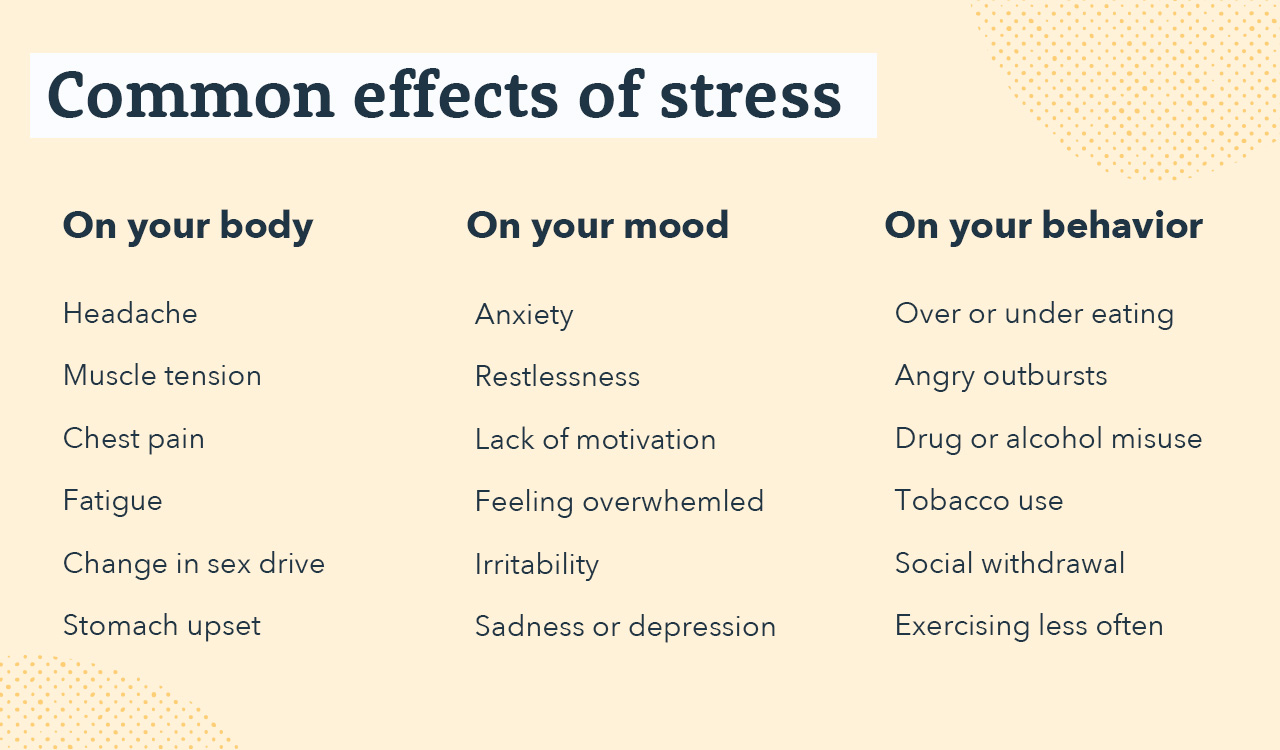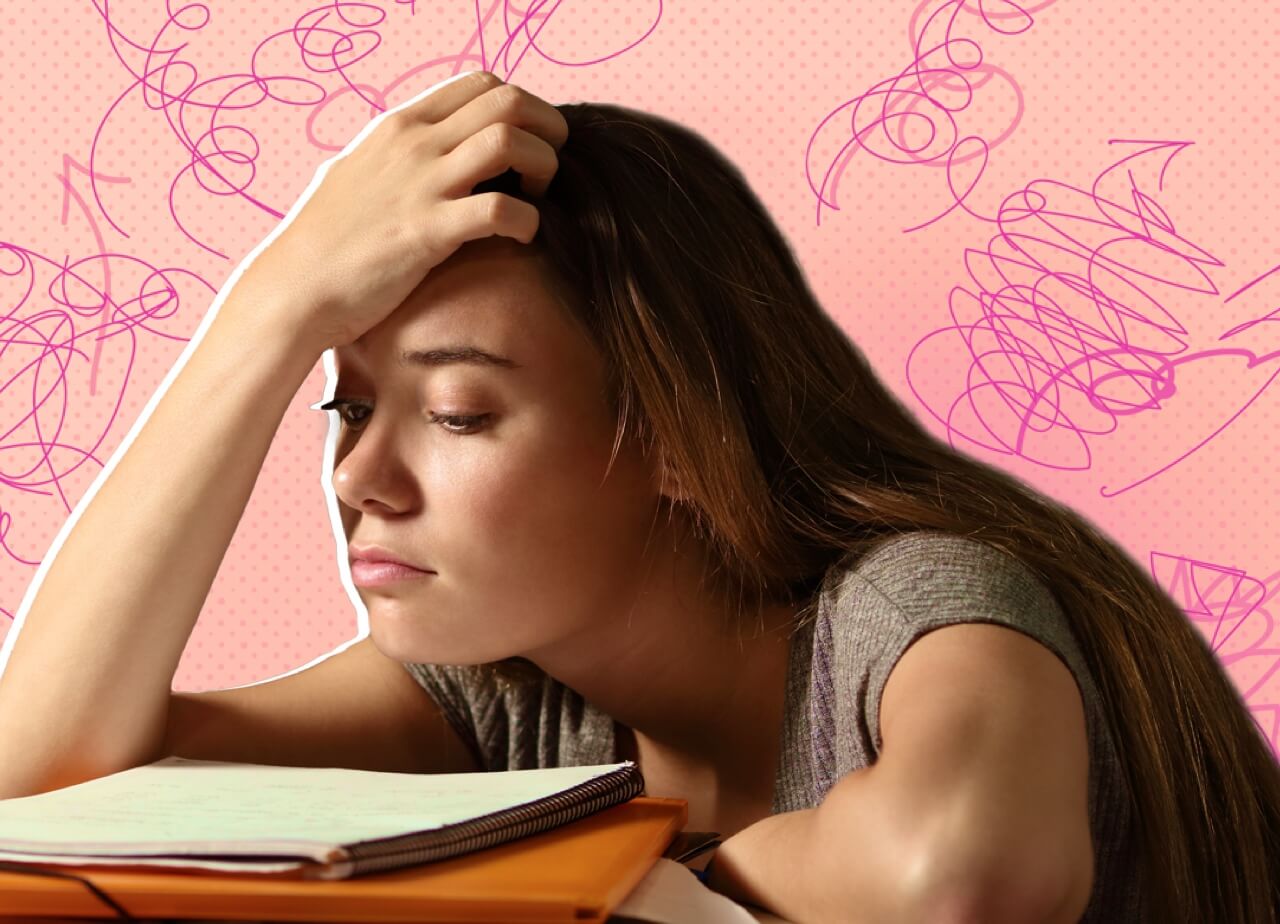April is stress awareness month. Don’t worry – that doesn’t mean we’re all supposed to be hyper aware of all of our stressors, but it does mean we should take stock of what stress does to us.
The word ‘stress’ comes from the middle english ‘stresse’ which is short for destresse (distress). While many of us use the term ‘stress’ in our daily lives, how is stress defined from a health perspective?
The National Institute of Health defines stress as “physical, mental, or emotional strain or tension.” The CDC defines stress as, “the result of pressures or tensions and how our body responds.”
So, what are the effects of strain and tension on our bodies?
Stress & physical health
Short amounts of stress can be a good thing. An uptick in cortisol (a stress hormone) will mobilize our body’s glucose and give us more energy. This is good if you’re trying to deal with an acutely stressful situation, like running from bears, zombies, or angry roommates.
Long-term, chronic stress is different and puts a lot of wear and tear on all the different systems in our bodies.
Stress affects all of our major bodily systems. During times of stress, our muscles tense, breathing becomes rapid, we start sweating, and some people even vomit. Stress can decrease libido, affect menstrual cycles, and weaken our immune responses. These are all highly documented and very common physical responses to stress.
The bodily stress response can be very powerful. The Mayo Clinic gives a handy example of stress and the effects it has on mood and behavior.

Academic stress
Anyone who has ever been a student understands and has felt the pressure of academic stress. For me, academic stress started in early high school.
I was constantly stressed out about the next thing. Must do well in high school to get into college, must excel in college to get into graduate school, must kick butt in graduate school to get a job. My personal version of academic stress was a continuous cycle of worrying about high performance and how it would affect the next phase of my life.
College can be especially tricky for many of us. It’s a perfect storm of being out of a home environment for the first time, dealing with complicated social dynamics, high performance expectations, and having to form all new social groups and support systems.

The kicker is, the more stressed you are, often the poorer you perform. While this may seem like an inescapable viscous cycle, there are ways to mitigate stress and how it affects you.
6 Stress reduction strategies while studying
We can’t expect not to be stressed during rigorous academic endeavors, but we can learn ways to slightly lessen how that stress affects us.
1. Take breaks
While the thought of ‘I can’t take a break, I have to study MORE!’ will surely come up, breaks have been proven to help us focus. It doesn’t have to be long or overly complicated. Set a 10-minute timer and leave your study area. Just give your mind a little breather. Empty the dishwasher, go stand outside, pet your dog/cat/chinchilla, or watch three movie trailers.
Just like most workouts, we rest in between sets. Studying is the same. Giving your mind a breather can make your next study session more productive.
✅ Try: The Pomodoro Method.
2. Breathing exercises
One thing I’ve found particularly important to remember is that this takes practice. I’ve been encouraged to use breathing techniques first while in a good headspace – not when you’re stress spiraling. Practicing the technique when you’re not worrying about other things builds the foundation for being able to call upon that technique later when you really need it.
✅ Try: Box breathing
3. Write it out
Putting pen to paper has always been a helpful tool for me. Naming out the things we find stressful can help us organize our thoughts around that particular stressor. Writing something out doesn’t mean we have a goal of fixing it, but it can help us confront and address a stressor rather than mentally spiraling out about it.
✅ Try: Not a writer? Draw or record what’s bothering you on your phone. Do anything that gets the things you’re stressed about out of your head and elsewhere.
4. Mindfulness
Sometimes mindfulness can feel like an elusive concept. It’s also often tied to meditation – ‘mindful meditation’. The National Institute of Health defines mindfulness as ‘a practice that cultivates abilities to maintain focused and clear attention and develop increased awareness of the present.’
Studies by the NIH also found that those who practiced mindfulness experienced less stress, lower anxiety, and better sleep. Practicing mindfulness requires you to set aside a little time and be present in that moment without judgment. It’s hard and it takes practice, but it can be a wonderful tool to center yourself.
✅ Try: Practice mindfulness, How to begin a mindfulness practice
5. Physical activity
A quick walk, putting away laundry, or mowing the lawn are all physical activities that can boost endorphins and shake your brain out of its stressed state by lowering cortisol. You don’t have to go full workout mode, just move your body.
If you are into working out, exercise is a very useful tool when it comes to dealing with and recovering from stress. This 2014 study showed that adults who engaged in regular exercise suffered fewer negative effects from stressful situations and were able to recover quicker.
6. Apps
For those who like an ‘app for everything’, the world has listened. There are many medication, mindfulness, and relaxation apps available. For some, the addition of guided instruction makes the process of meditation or relaxation much easier and more attainable. Here are a few options to try:
- Insight Timer – free
- Smiling Mind – free
- Calm – paid subscription
- Headspace – paid subscription
Bottom line
We can’t avoid stress but we can learn to manage it. If you’re studying, the pressure of academic stress can feel enormous. The upside is that your time as a student won’t last forever. While I don’t look back on my all-nighters fondly, I do wish I’d had the perspective and tools that I do now.
Keep calm and study on.

 learning science
learning science